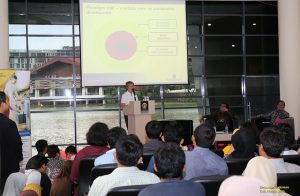Minister of Strategic Development and Nordic Cooperation of Sweden, Kristina Persson, gave public lecture about the importance of ecology-based sustainable development.
In her speech at UI Library, Persson emphasize the importance of preserving environment. The rationale strengthen because based on Sweden experience, environment is not only a place for human to live, but also determinant of economy policy of a country. Sweden has applied the strict rules about sustainable development. In 2008, people of Sweden produce carbon dioxide about 5 metric tons per capita or equal with 5000 kilogram per person. The amount decreased drastically than the end of 1960 era that reached 10 metric tons per capita.
The falling trend of carbon consumption in Sweden happen because people are aware of the balance of nature. Despite of that, Persson stated that the carbon consumption attainment still not satisfied enough. “There will be need for 3,5 more of earth if our life style are still like now,” said woman who has been working for Sweden Government since 1971.
The best effort of Sweden on sustainable development also can be seen from Hammarby Sjöstad rearrangement project. The urban city that is located on Stockholm has successfully reduce fossil fuel usage drastically. More over, clean water treatment, garbage, and mass public transportation system has been managed in order to be more efficient in energy absorption. No wonder, Hammarby became the eco-friendly urban city that has been referred several times by other cities in the world.
Contrast from Sweden, Indonesia faces different problem. According to Faculty of Economy and Business lecturer, Ahmad Mubariq, who became the second speaker in the public lecture, still depend on extractive resources suh as oil, gas, and palm oil. “Government is delighted with the benefit of those sector. In fact, there are lots of other sector that can be utilized,” said the former 2003-2009 excutive director of WWF.
In conclusion, Mubariq and Persson agreed that sustainable development is important for all countries. Even though carbon emission control depends on each country’s policy, cooperation is absolutely needed in order to prevent disaster that is caused by global warming.




